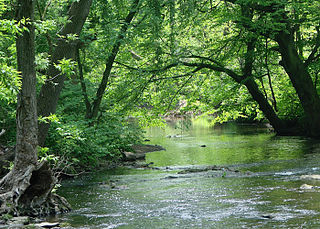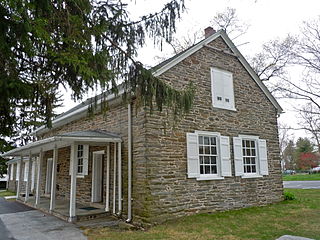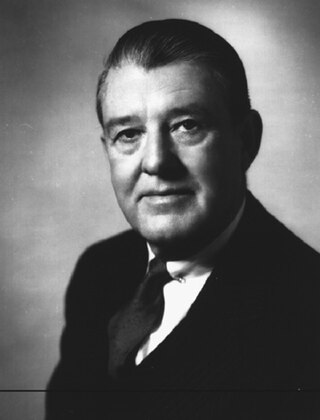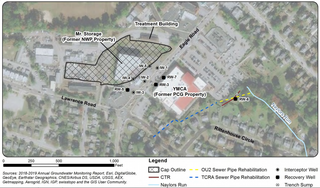Related Research Articles

Haverford Township is a home rule municipality township in Delaware County, Pennsylvania, United States. Haverford is named after the town of Haverfordwest in Wales. It is a commuting suburb located due west of Philadelphia and is officially known as the Township of Haverford. Despite being under a home rule charter since 1977, it continues to operate under a Board of Commissioners divided into wards, as do "First Class" townships that are still under the Pennsylvania Township Code. Haverford Township was founded in 1682 and incorporated in 1911.

Lower Merion Township is a township in Montgomery County, Pennsylvania, United States. It is part of the Philadelphia Main Line. The township's name originates with the county of Merioneth in north Wales. Merioneth is an English-language transcription of the Welsh Meirionnydd.

Narberth is a borough in Montgomery County, Pennsylvania. It is one of many neighborhoods on the historic Philadelphia Main Line. The population was 4,282 at the 2010 census.

Penn Wynne is a census-designated place (CDP) in Montgomery County, Pennsylvania, United States. It is part of Lower Merion Township, and the mailing address is Wynnewood. The population was 5,697 at the 2010 census. It is mainly a residential area. The main arteries are Haverford Road and Manoa Road.

Ardmore is an unincorporated community and census-designated place (CDP) spanning the border between Delaware and Montgomery counties in the U.S. state of Pennsylvania. The population was 12,455 at the time of the 2010 census and had risen to 13,566 in the 2020 census.

Darby Township is a township in Delaware County, Pennsylvania, United States. The population was 9,264 as of the 2010 census. It is home to both residential areas and expansive industrial districts. Darby Township is home to a diverse population and its industrial districts are popular among shipping companies for their proximity to Philadelphia International Airport. It also is known for being made up of two non-contiguous geographical areas, requiring one to pass through at least two neighboring municipalities to make it from one end of Darby Township to the other. Darby Township is a distinct municipality from the nearby and similarly named Darby Borough and Upper Darby Township.
Hilltop or Hill Top is the top of a hill and may refer to:
The Philadelphia Yearly Meeting of the Religious Society of Friends, or simply the Philadelphia Yearly Meeting, or PYM, is the central organizing body for Quaker meetings in the Philadelphia, Pennsylvania, United States area, including parts of Pennsylvania, Maryland, Delaware and New Jersey.

Havertown is a residential suburban unincorporated community in Haverford Township, Pennsylvania, United States. It is located approximately 9 miles west of the center of Philadelphia. Havertown's ZIP Code is 19083 and "Havertown" is a postal address. The name "Havertown" was coined by the U.S. Post Office and came into use on January 1, 1946. Before then, each constituent community was known by its local name: Bon Air, Brookline, Penfield, Beechwood, Llanerch, Manoa, Oakmont, Coopertown, and Ardmore. Under William Penn's land divisions these communities were part of the Welsh Tract and comprised the area known as Harford, a Welsh contraction of Haverford.

The Cradle of Liberty Council (#525) is a Boy Scouts of America council created in 1996 with the merger of the former Philadelphia Council and the former Valley Forge Council.

Delaware County Community College (DCCC) is a public community college with campuses and facilities throughout Delaware and Chester Counties in Pennsylvania. DCCC was founded in 1967 and is accredited by the Middle States Commission on Higher Education. The college offers 53 associate degree programs and 43 certificate programs at nine different locations.

The Philadelphia Chewing Gum Corporation was a Pennsylvania corporation formed on August 12, 1947, to manufacture candy, chewing gum, and specialty confectionery products. The company was also notable for its American Football Cards when in 1964 the company signed a deal with the NFL.

William H. Milliken Jr. was an American politician from Pennsylvania who served as a Republican member of the U.S. House of Representatives for Pennsylvania's 7th congressional district from 1959 to 1965. He served in the Pennsylvania House of Representatives for Delaware County from 1943 to 1946 and from 1949 to 1950.

White Clay Creek Preserve is a 3,050-acre (1,230 ha) Pennsylvania state park along the valley of White Clay Creek in London Britain Township in Chester County, Pennsylvania in the United States. The park was donated by the DuPont Company in 1984 for the purpose of "preserving the diverse and unique plant and animal species, and the rich cultural heritage of the area". Dupont also donated an additional 528 acres (214 ha) for the adjoining White Clay Creek State Park to the state of Delaware. White Clay Creek Preserve is 3 miles (4.8 km) north of Newark, Delaware on Pennsylvania Route 896.

The Lawrence Cabin is a log cabin located on Cobbs Creek in Powder Mill Valley Park in Havertown, Pennsylvania, near Nitre Hall.

Dixmont State Hospital was a hospital located northwest of Pittsburgh, Pennsylvania. Built in 1862, Dixmont was once a state-of-the-art institution known for its highly self-sufficient and park-like campus, but a decline in funding for state hospitals and changing philosophies in psychiatric care caused the hospital to be closed in 1984. After more than two decades of abandonment, it was demolished in 2006. The campus spanned a total of 407 acres (165 ha). Reed Hall is listed on the National Register of Historic Places.

Haverford Senior High School is the public high school of Haverford Township, Pennsylvania, United States, operated by the School District of Haverford Township. It is at 200 Mill Road in Havertown. The school serves the entirety of Haverford Township, including all of the unincorporated community of "Havertown", and the Haverford Township portions of the unincorporated communities of Haverford, Bryn Mawr, Ardmore, Drexel Hill, and Wynnewood.

Havertown Superfund is a 13-acre polluted groundwater site in Havertown, Pennsylvania contaminated by the dumping of industrial waste by National Wood Preservers from 1947 to 1991. The state first became aware of the pollution in 1962 and initiated legal action against the owners in 1973 to force them to cleanup the site. The Environmental Protection Agency (EPA) ranked the site the eighth worst cleanup project in the United States. The site was added to the National Priorities List in 1983 and designated as a Superfund cleanup site in the early 1990s. Remediation and monitoring efforts are ongoing and the EPA transferred control of the site to the Pennsylvania Department of Environmental Protection in 2013.
Local government in Pennsylvania is government below the state level in Pennsylvania. There are six types of local governments listed in the Pennsylvania Constitution: county, township, borough, town, city, and school district. All of Pennsylvania is included in one of the state's 67 counties, which are in total subdivided into 2,560 municipalities. There are currently no independent cities or unincorporated territories within Pennsylvania. There is only one incorporated town in Pennsylvania, Bloomsburg.

Thornton is an unincorporated community spanning Thornbury Township, Concord Township and Middletown Township in Delaware County, Pennsylvania, United States.
References
- ↑ "Gettysburg Times - Google News Archive Search". news.google.com.
- 1 2 Pennsylvania Attorney General. Attorney General Corbett announces grand jury report of investigation into misconduct by officials in Haverford Township, Delaware County; Criminal charges filed against commissioner Archived 2011-07-18 at the Wayback Machine (05 April 2007)
- ↑ Needles, Zack. "Superior Court Denies Haverford Twp. Commissioner's Appeal" The Legal Intelligencer, 26 August 2010.
- ↑ "The Township of Haverford, Pennsylvania / Haverford Reserve". www.haverfordtownship.org. Archived from the original on 2019-05-27. Retrieved 2019-05-27.
- ↑ Puglionesi, Lois (14 July 2014). "Haverford Reserves' recreation success story". Main Line Times. Retrieved 26 August 2020.[ permanent dead link ]